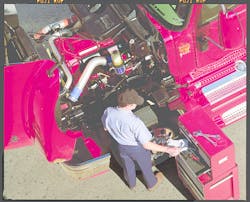As happens on occasion, I am pressed for a topic this month. Rather than re-hash an old topic, I thought I would give the Fleet Maintenance readers a chance to select the next topic.
What follows are some hot issues in training today. Which of these topics would you like to get more in-depth information on? Let me know by e-mailing me at [email protected], and I will discuss those topics in future columns. Here is the list:
- Impact of vehicle technology advancements.
From Tier 4 engine emission controls, to advanced body control systems, to telematics and driver tracking devices, vehicle technology continues to advance at a substantial rate. Do your technicians have the core skills and knowledge to diagnose these types of systems?
Training may play a big role in keeping your maintenance staff current.
- Impact of training and information technology.
In addition to vehicle technology, methods for delivering training and service information are advancing rapidly. From "training in the Cloud" to smart phone apps, current and future maintenance professionals have a lot of choices to consider.
Many managers have trust issues with online information and there is certainly a business impact, given the multitude of diagnostic tips and other information technicians can sift through.
- Brain drain.
The first "baby boomers" (people born between 1946 and 1964) hit official retirement age in 2011 and there will be record numbers of workers dropping out of the labor force over the next several years.
A lot of accumulated knowledge and experience will leave with them.
Does your operation have a plan to capture the knowledge and skills of retiring workers, as well as prepare their replacements?
Such strategies have become a hot topic in training circles.
- Training ROI.
With many cutbacks to HR staffs since the economic downturn of 2008 to 2009, many training operations have been downsized and in-person classes have been eliminated or severely reduced.
There is an increasing focus on training's return on investment, or more appropriately, return on instruction. Previously a "wish list" item for training departments, collecting tangible ROI data has become mandatory.
What are the best methods for measuring training ROI and what data gives a more accurate view of continuous learning's benefits?
I look forward to my inbox being filled up with your suggestions for future column topics.
About the Author

Stephen Howe
Manager, Maintenance and Technical Training, United Rentals
Stephen Howe is manager of maintenance and technical training for United Rentals. www.unitedrentals.com. Founded in 1997, United Rentals is the largest equipment rental company in the world, with an integrated network of more than 850 rental locations throughout the United States and Canada. Howe is a past president of the Automotive Training Managers Council (ATMC), a global organization of training managers from automotive aftermarket, OEM, supplier, service tool and training companies. www.atmc.org.
